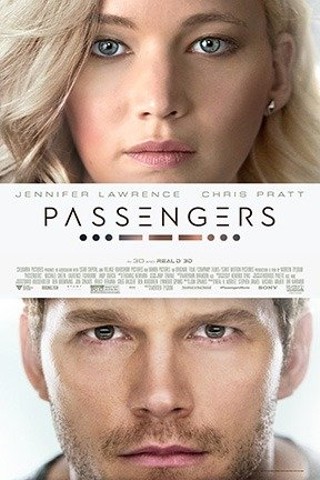Though Passengers is based on an original concept, it feels as though it could be adapted from a golden-age Ray Bradbury tale, which is about the highest compliment I could give a sci-fi movie. The starship Avalon rockets to a distant planet, carrying more than 5,000 comatose earthlings. At the end of its decades-long flight, Avalon will rouse the humans from their suspended animation, but in the meantime it chugs through space on autopilot, as it was designed to do. Avalon's automated vacuum cleaners and artificial-intelligence bots go about their lonely work with a chipper can-do spirit, evoking the post-apocalyptic automated house of Bradbury's "There Will Come Soft Rains."
Of course, something goes wrong. Jim (Chris Pratt) is roused from his cryogenic slumber about 90 years too soon, and for the first half-hour of the film, he's the only living human being for light-years in every direction. Pratt is at his best in these scenes, acting out equal parts wish fulfillment — imagine being the only person on a luxury cruise — and the nagging sensation that he's the butt of a bad cosmic joke. His only companionship comes from a robot bartender named Arthur, played with amicably creepy Shining vibes by Michael Sheen.
Then a sleeping beauty named Aurora (Jennifer Lawrence) wakes up, and Passengers becomes a romance. Pratt has the more interesting work to do here; Lawrence's main job, unfortunately, is to react to his actions and emotions. The pair have great chemistry, and watching two people in peak physical condition seduce each other on an impeccably designed starship could never be a boring moviegoing experience. An early twist involving Aurora's awakening adds a difficult moral layer to the film that Pratt eagerly embraces, and Lawrence does some of her best acting around those scenes.
But there's a point in Passengers when the movie collapses under its own premise, and it never fully recovers from that catastrophe. I'll avoid spoilers, but suffice it to say that a complex story about love and responsibility, and how the choices we make affect others, rapidly descends into a string of sci-fi clichés and poor characterization.
Although Pratt and Lawrence both lose sight of their characters at important moments, Passengers' failure doesn't reflect poorly on them. On the contrary, they're among the only big-budget American actors who could sustain a film that's basically a two-hour duet. No, most of the blame must go to director Morten Tyldum, whose previous film, The Imitation Game, was also emotionally flat.
Under Tyldum's guidance, Passengers is missing both nuance and cleverness. Its score is obvious to the point of annoyance. Its action beats feel perfunctory. A special cameo midway through the movie feels like a waste of a great actor. Of all the behind-the-scenes contributions, only the visual design is especially great. A more minimalist director could've found the heart in this script without relying on a weak array of bullshit directorial tricks we've all seen a thousand times on basic cable. (Just thinking of what Steven Soderbergh could've done with this thing is enough to make a critic weep bitter tears.)
All that said, I can't help but compare Passengers favorably to the recently released Rogue One: A Star Wars Story. I'd rather watch a dozen half-great original sci-fi concepts than one more chunk of Disney brand management which fills in some trivial blanks that George Lucas left in a screenplay 39 years ago. Better that an original sci-fi film starts strong and fails spectacularly, as Passengers does, than to languish in the morass of franchise mediocrity. ♦

















